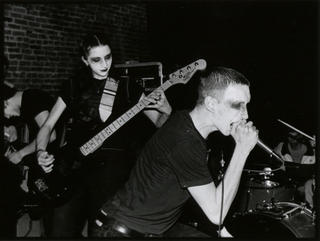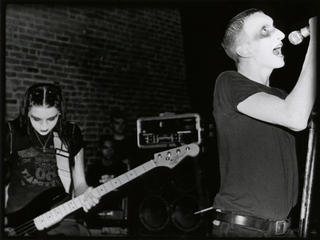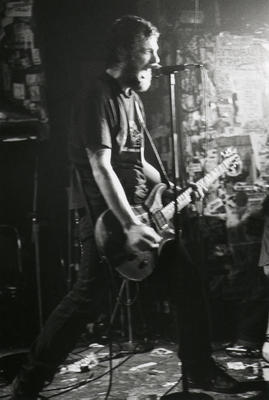Saturday, July 30, 2005
Wednesday, July 27, 2005
These ain't no blue suede shoes
 This here bunch of young men was one of a group of bands, mostly from the Southwestern U.S., whose sound was defined by various parts grind and metal with a healthy bit of a southern sludge influence. Enewetak, much like Unruh and Suicide Nation (about both of whom I’ll probably write more in the future), was fairly well known for a while, but didn’t achieve quite the lasting notoriety of other hardcore bands that were active in the mid to late nineties. However, Enewetak’s only CD full-length release, Onward to Valhalla, is still around and with a bit of patience you might also be able to find some of their EPs.
This here bunch of young men was one of a group of bands, mostly from the Southwestern U.S., whose sound was defined by various parts grind and metal with a healthy bit of a southern sludge influence. Enewetak, much like Unruh and Suicide Nation (about both of whom I’ll probably write more in the future), was fairly well known for a while, but didn’t achieve quite the lasting notoriety of other hardcore bands that were active in the mid to late nineties. However, Enewetak’s only CD full-length release, Onward to Valhalla, is still around and with a bit of patience you might also be able to find some of their EPs.Now, I googled the hell out of these guys without really being able to come up with much in the way of solid information, so I’m mostly relying on record inserts. Those lead me to believe that Enewetak was around from ca. 1995 to probably 1998, give or take a year or two, during which they released two 12”s, three 7”s (including a split with Unruh on Feast and Famine) and the aforementioned CD.
What I like about Enewetak is that their sound is unapologetically dirty and fierce. Unlike bands like Kilara, Cavity - or Eyehategod, for that matter - they don’t rely quite as much on long sludgy jams (they had no problem getting their point across in under a minute) and the slow parts they did use were frequently interspersed with grind attacks and more angular metal riffing.
The name and appearance of their 1996 7” The Easyrider Sessions Vol. I (and there never was more than a Vol. I) on Buk Buk Records might lead you to assume that this a little disc chock full of southern rock, but really it’s a big ol’ tribute to Black Sabbath (whose members they thank individually in the insert). ‘The Accident’ and ‘Armageddon’ are the most obvious examples in that regard, but you also get bits and pieces in some of the other songs. The Easyrider Sessions Vol. I is thus not entirely representative of what Enewetak did on their other releases, but it’s every bit as enjoyable as any of them (though Guns. Elvis loved them. probably takes the cake for best title).
Members of Enewetak went on to be in Hot Pursuit, The Mistake and Tafkata. I haven’t heard any of these bands, so if you have an opinion on them feel free to comment.
Enewetak – The Accident
Enewetak – Deathbed
Enewetak – Supercrust
Enewetak – Armageddon
Enewetak – It’s a small world after all
Enewetak – Cease to exist
Sunday, July 24, 2005
Outliving a foregone conclusion
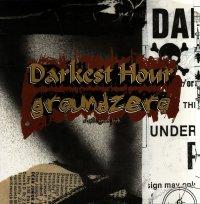 I’ve been looking for an excuse to write about how great I think Darkest Hour’s new record is. Well, here it is – two older songs from split releases with Ground Zero and Dawncore.
I’ve been looking for an excuse to write about how great I think Darkest Hour’s new record is. Well, here it is – two older songs from split releases with Ground Zero and Dawncore.Anyway, did I mention how much I like Undoing Ruin? Like, when the chorus kicks in for the second time in song one, when the beat slows down to a heavier crunch? It almost feels wrong to listen to this in the middle of the summer; it’s rainy day music. Walking through the rain, an overcast sky, and then right into the next song, ‘Convalescence’ – “nothing thrills me, nothing kills me” – and that great guitar melody that borders on cheesy, but it’s not; just a little sad. Those hooks are all over the record, of course, and I can’t get enough of it. It’s not power metal, there’s less method and more raw feeling, yet it’s very controlled and well-structured throughout. In Flames and Soilwork can’t touch this. And yet there are plenty of places to raise your fists in the air and climb onto the persons sitting next to you on the subway for a metal pyramid.
There’s that thrash attack that starts off ‘This will outlive us’ that leads into the more standard hardcore-leaning riffing and the song’s quasi chorus – “My life is a blank piece of paper, staring back at me.” Yes, more of that! Instead, we get a slow breakdown of sorts to wrap up the song. ‘Low’ is just a full-on feel-good blast, while ‘These fevered times’ bares more than a fleeting resembles to ‘The fevered circle’ and the rest of Terminal Spirit Disease – but, by no means a rip-off, it sounds more like an expression of musical brotherhood, of the shared experience of the eerie melodrama of life. I could go on and on, but the record’s been reviewed better than I could do in plenty of places already, so let me just say that, even if it’s not a metal milestone, this is one very fucking solid release and a lot of fun to listen to.
Darkest Hour’s split with Ground Zero was released in 1999 on East Coast Empire. ‘Faith like suicide’ fits right in with the songs on Mark of the Judas and, to me, serves as the earliest indication of what this band was really capable of doing. At over six minutes, it’s a pretty long song, and the recording is pretty muddy, but the riffing and dynamic changes that made Mark of the Judas such a good record are all there. ‘With friends like these,’ released in 2001 as a CD single by Join the Team Player Records, has more of a rocked out feel to it. It’s really built around a single riff, but it’s short enough to feed off that riff without losing any steam. Both of these, by the way, were recorded by Ken Olden.
The split with Dawncore is still available (e.g. at Interpunk) – even more easily so if you live in Europe – and the split with Ground Zero shouldn’t be too hard to find either, so I encourage you to keep an eye out for both. Go visit Darkest Hour for more info, tabs and merch and come out to see these guys play when you have a chance, if you haven’t yet. They’re a hell of a live band.
Darkest Hour – Faith like suicide
Darkest Hour – With friends like these …
Saturday, July 23, 2005
Rejoice in nothing
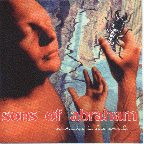 It’s pretty hard to miss the presence of Christian bands in the hardcore scene, at least in the U.S. (curiously, I am not aware of any Christian hardcore bands outside of this country, though I would assume there must be at least a handful). Then there was Krishna-core, with bands like Shelter and 108, which are slated to reunite for this year’s Hellfest. (For some reason there was more of an export market for Krishna-core in its heyday, with imitators and vegan Krishna soup kitchens popping up in various places all over Europe. Someone should look into this; might make for a good dissertation.) And of course we all remember the burgeoning Jewish hardcore scene.
It’s pretty hard to miss the presence of Christian bands in the hardcore scene, at least in the U.S. (curiously, I am not aware of any Christian hardcore bands outside of this country, though I would assume there must be at least a handful). Then there was Krishna-core, with bands like Shelter and 108, which are slated to reunite for this year’s Hellfest. (For some reason there was more of an export market for Krishna-core in its heyday, with imitators and vegan Krishna soup kitchens popping up in various places all over Europe. Someone should look into this; might make for a good dissertation.) And of course we all remember the burgeoning Jewish hardcore scene.Say what?
Alright, it wasn’t so much a scene as just one band, and you wouldn’t even know it if their name hadn’t given it away – Sons of Abraham. The only place where they talk about their Jewish heritage is in the insert to their first release, a split 7” with Indecision on the long-defunct Wreck-Age imprint Exit Records, which also released their only full-length. The short text talks about the millennia-old attempts to extinguish the Jewish “heritage, culture and faith.”
But they also write that “the crass vandalism of reichskristallnacht is no match for the sophisticated seduction of the american media” and American consumerism that have turned Christmas into a truly all-consuming experience for people of all faiths, the “spirit of giving” thinly veiling the all-pervasive dictum You Are What You Buy. Their response, rendered in song, is: “no presents for christmas, no thanksgiving feasts/ no presents for christmas, no drunken new year’s eves/ you took your christ out of christmas and tried selling him to us instead.”
That song, here simply called ‘song #2,’ reappeared as the title track of Sons of Abraham’s full-length, Termites in his smile, which they recorded in late 1997. But references to religion are scant in the rest of the songs on this record (though ‘Dos Equis’ is about two-faced straight edgers, if that counts). Similarly, the insert text accompanying this release merely talks about what is arguably the essence of hardcore – finding beauty in new places and making new friends – and the lyrics are generally of a more personal nature.
As you’ll be able to tell from the songs below, what you get here musically is extremely well-written metallic hardcore, mixing rhythmic guitar leads with crunchy riffs and the occasional breakdown. Some of it actually does remind me of Songs of Separation-era 108, while the use of guitar overtones is reminiscent of Snapcase. Amazon sells new copies of this little beast of a record, but you can probably also find it used somewhere for a few dollars. As you may know, members of Sons of Abraham went on to play in, among others, Glassjaw and This Year’s Model.
Sons of Abraham – What brings May flowers
Sons of Abraham – Nowhere circles around a plastic toy
Sons of Abraham – Termites in his smile
On a different note, ever wondered which former members of [insert name of xSEx band] lost their edge? Go to How’s your edge and find out!
Thursday, July 21, 2005
Wednesday, July 20, 2005
A common cause for the common good
 This is going to be another easy one, and by that I mean that I know very little about this band, but want to share the music with you anyway. What I could find out is this: Fall into the Sear and Yellow Leaf were from Tyler, TX, and released a 7“ on Watership Records sometime in the mid-nineties. The songs on the EP are numbered four through eight, so perhaps there was an earlier demo recording, but I don’t think they put out any other records after this one.
This is going to be another easy one, and by that I mean that I know very little about this band, but want to share the music with you anyway. What I could find out is this: Fall into the Sear and Yellow Leaf were from Tyler, TX, and released a 7“ on Watership Records sometime in the mid-nineties. The songs on the EP are numbered four through eight, so perhaps there was an earlier demo recording, but I don’t think they put out any other records after this one.The first thing you see when you open the inside cover is an illustration of bunnies, squirrels and the like with the heartwarming caption “The giddy forest animals celebrate the end of the human race.” But that by no means sums up what this band stood for, which I can tell you a little more about because they also provided extensive explanations for the lyrical content of all of the songs. One deals with hardcore kids preaching to the choir, another with getting bullied by corporate America. Song #5 pits peaceful resistance against mindless molotov-cocktail-throwing and #7 espouses the ‘virtues’ of the military industrial complex and its recruiting methods. This may sound like run-of-the-mill radical rhetoric, but the actual lyrics always seek, and frequently touch upon, a more personal angle that keeps them from being overly preachy or contrived.
Singer Matt delivers the lyrics in throaty screams that are nothing out of the ordinary, but that fit nicely with the music – pounding mid-paced hardcore weighted toward the low end, yet with enough variation and drive to keep the songs interesting. Groundwork comes to mind as a comparison.
Two members of Fall into the Sear and Yellow Leaf resurfaced in other bands – drummer Kevin in Quien’ es Boom! and Matt in Pop Unknown, along with former members of Mineral.
Fall into the Sear and Yellow Leaf – #6
Fall into the Sear and Yellow Leaf – #4
Fall into the Sear and Yellow Leaf – #5
Fall into the Sear and Yellow Leaf – #7
Friday, July 15, 2005
Dining alone in Minnesota
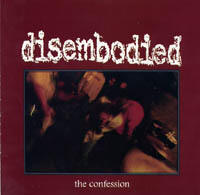 1995 was not a bad year for hardcore and metal. In the distant reaches of the far north, something was brewing. And, no, I’m not talking about the release of Slaughter of the Soul – while the Swedes were redefining thrash, a quintet in Minneapolis was going the opposite route by slowing things way down and thus doing their part in the evolution of hardcore, at the same time alienating metal purists all over the known universe. They were called Disembodied.
1995 was not a bad year for hardcore and metal. In the distant reaches of the far north, something was brewing. And, no, I’m not talking about the release of Slaughter of the Soul – while the Swedes were redefining thrash, a quintet in Minneapolis was going the opposite route by slowing things way down and thus doing their part in the evolution of hardcore, at the same time alienating metal purists all over the known universe. They were called Disembodied.In 1996, after their first EP on Furface Records, Disembodied released another EP, The Confession, on Moo Cow, their first properly distributed record, which I picked up that same year somewhere in Germany, probably because I read somewhere that they were at least partly a straight edge band, yet didn’t feel the need to be preachy, instead opting to go for a much more dismal level of expression. So I was curious, and I instantly got hooked on what they were doing.
Fast forward to the Winter of 2004. My brother and I are driving along an empty road on our way to see friends of ours at their practice space and we’re trying to decide what music to put on in the car. I hadn’t really listened to Disembodied in years, but for some reason the dial stopped at Heretic, their final full-length release on Edison. We turned up the volume and about a minute later we both kind of looked at each other, stunned upon the realization how powerful this band really was. Then we turned up the volume some more.
By then, Disembodied had long broken up, its members having moved on to form Martyr a.d. as well as Pelican. But they left behind a solid number of recordings, from their first EPs as well as Diablerie and its follow-up If God only knew the rest were dead, both out on Ferret, to Heretic and Oxymoron, their split with Brother’s Keeper on Trustkill that also featured a cover of Quicksand’s ‘Dine alone.’ The latter is notable for its faithfulness to the original, yet it retained every bit of Disembodied’s distinct heaviness. But their earlier records certainly don't lack in that regard either. I’ve seen Diablerie compared to Roots-era Sepultura and I can’t entirely disagree with that, although Disembodied whittled down the grooves to their bare elements and ultimately went for a sound that was both more stripped down and more guttural, paired with throaty vocals that represented the most tangible connection to their own roots in the hardcore scene.
To the best of my information, there were a total of 2,200 copies of the Confession 7” and it was never re-released on CD, and although the recording and songwriting is not as tight as on Disembodied’s later releases, the EP’s three songs are well worth a listen. So here ya go.
By the way, while looking for information on both Countdown to Oblivion and Disembodied I repeatedly came across Blood Sisters, a website dedicated to female musicians in hardcore and metal bands. I’m not sure whether it’s still being updated, but it’s still a good resource and a good reminder for how much ass girls in bands have kicked over the years. FYI – your girlfriend is not a coat rack! So check it out and, of course, find and buy all of Disembodied’s records.
Disembodied - Feel
Disembodied - Confession
Disembodied - Expressionless
Sunday, July 10, 2005
To our friends in the Great White North
 Cursed is on tour again and has been getting a lot of good reviews for Two, their second full-length. Arguably, at least half of what makes them stand out as a band is Chris Colohan’s distinct vocals, the musical red threat holding their songs together, as much as in any previous band he has been in.
Cursed is on tour again and has been getting a lot of good reviews for Two, their second full-length. Arguably, at least half of what makes them stand out as a band is Chris Colohan’s distinct vocals, the musical red threat holding their songs together, as much as in any previous band he has been in. Colohan first got attention as a vocalist when he joined three former members of Chokehold to form Left for Dead. Following that was, of course, The Swarm, a band that was matched in intensity only by the likes of Catharsis, Ire and His Hero Is Gone. Both Left for Dead and The Swarm have discography CDs out, which, if you haven’t already, I urge you to check out.
As you may know, aside from Cursed, Colohan is also a member of Ruination. However, what you may not know is that from 1998-2000, he also sang in Toronto’s Countdown to Oblivion, sharing vocal duties with Stephe Perry. Over the course of those two years, they recorded a demo, a 7” entitled Brain surgery for beginners (Deranged), a split 7” with They Live (Ugly Pop) and a handful of compilation tracks. Notably, the band also included former members of Anti-Flag and Holocron, among many others.
Now, here’s the thing: Countdown to Oblivion’s music is every bit as powerful as anything by Colohan’s other bands. It’s fast and angry and the riffing is decidedly on the metal side, dual guitar harmonies and all, but with a hardcore feel to it, in no small part thanks to the vocals. Best of all, with a little luck you should easily be able to find copies of the EPs and, believe me, they’re worth a bit of digging. (And speaking of digging, if anyone could help me get a hold of any of the compilation songs, I would greatly appreciate it.)
To wet your beak, here are two songs off Brain surgery and one of the songs from the split. For more detailed information on the band, check out Ugly Pop.
Countdown to Oblivion – The way it is
Countdown to Oblivion – Take it apart
Countdown to Oblivion – Poster children for family values
Saturday, July 09, 2005
Yeah, they could definitely hurt a fly
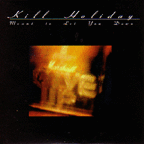 I had a few other things lined up for the next few updates, but I’m feeling kinda, um, emotional tonight, so I decided to depart from the general vibe of the last handful of bands on here. Alright, I’m not doing Kill Holiday any justice by labeling them as emo, and I am sure as hell not going to get into any discussion about what is and isn’t emo. Lines like “Can I rest my head on your cold shoulder” speak for themselves.
I had a few other things lined up for the next few updates, but I’m feeling kinda, um, emotional tonight, so I decided to depart from the general vibe of the last handful of bands on here. Alright, I’m not doing Kill Holiday any justice by labeling them as emo, and I am sure as hell not going to get into any discussion about what is and isn’t emo. Lines like “Can I rest my head on your cold shoulder” speak for themselves.One fine day, I’ll tell you about all the times I didn’t get to see Unbroken for one reason or another. My only consolation consisted of seeing Kill Holiday later on. Granted, two bands could hardly sound more different, but at least I had the opportunity to see Andrew Steven Miller and Todd Beattie play. This is fanboy stuff, I know, but bear with me, because Kill Holiday were actually a pretty good band in their own right.
Their sound changed quite a bit from release to release. Their first EP, Monitor Dependency (New Age, 1995) was still a little rough around the edges, with more distortion and over-the-top whiny vocal harmonies. For their next record, a split 7” with Dempsey on Indecision, they seemed to look more to the East Coast for inspiration, particularly Quicksand. The whininess would never fully abate, but the songwriting became more focused, at the same time introducing a more danceable restlessness on the rhythmic side.
That shake-your-booty element became even more palpable with the 7” Kill Holiday released on Simba Records in 1997, on the occasion of their European tour. You have to remember, this was also the heyday of the ‘50s meets ‘80s revival – gelled-back hair, gas station attendant shirts, Doc Martens, the whole shebang – and you can sort of hear that in these songs as well, especially in ‘Meant to let you down.’ Simply speaking, it rocks, though it seems the ghost of Walter Schreifels was back in the studio when they recorded the B-side, ‘One more time for me please (then I’ll go).”
If you’re into Brit Pop, you might also want to check out the full length Kill Holiday subsequently released on Revelation. Personally, I’m not.
Kill Holiday - Agenda
Kill Holiday - Sugar rush
Kill Holiday - Meant to let you down
Kill Holiday - One more time for me please (then I’ll go)
Tuesday, July 05, 2005
Write of me what you will
 I wasn’t going to post any more Damnation a.d. yet, but I’m having some problems with my audio set-up, so I have to work with what I have. No loss to you, though.
I wasn’t going to post any more Damnation a.d. yet, but I’m having some problems with my audio set-up, so I have to work with what I have. No loss to you, though. Initially, Damnation a.d. was just Ken Olden of Battery (and later Better than a Thousand), who more or less single-handedly recorded the songs ‘Damnation’ and ‘On a pale horse,’ released as a 7” on Tidal in 1994. He was later joined by Mike McTernan, brother of Battery singer and recording engineer Brian McTernan, on vocals, and Hillel Holloway, Greg Merchlinsky and Dave Ward on guitar, bass and drums, respectively.
Following this release were a 7” on the infamous Lost & Found label (‘The Hangman’ b/w ‘Sleep’), a split 7” with Walleye on Jade Tree (‘In the flesh’) and a split 7” with Dead Beat on Stillborn that featured a cover of The Cure’s ‘Cold.’ Except for the songs from the splits, all others were later re-recorded or released as live songs on No more dreams of happy endings, Misericordia (Jade Tree) and their Revelation Records debut Kingdom of Lost souls.
Lyrically, as you might expect, ‘Damnation’ is sort of a theme song, while its B-side ruminates on the loss of meaning in the face of adversity and lies. Here, as in many of their later lyrics, they take a minimalist and very personal approach to the writing, which can consequently be interpreted in any way you please:
Lost your job/ girlfriend/ winning lottery ticket? “All I want is to understand/ why everything good melts like ice in my hand.”
Tired of other people taking advantage of your rolodex/ math homework/ Samaritan instincts? “I’m your drug I’m what you need to survive/ abuse me, when you’re done throw me aside.”
Your friends/ baseball heroes/ financial adviser disappointed you? “Everyone seemed so perfect/ but they all fell down.”
No one understands you? “My words are spit back at me.”
So life’s never going to get any easier? “Eternity is forever.”
Okay, Shakespearean ‘tis not. But in the context of the re-emergence of Straight Edge and its militant outgrowths in the early and mid nineties, you could also look at Damnation as a reality check for ‘the kids,’ i.e. the burgeoning hardcore scene. As such, it represents the flip-side to Battery’s go-getter posi-core – if they were dates, you would want Battery to be the one to introduce to your parents, while secretly hooking up with Damnation for hot sex and knife play.
That goes for the music as much as for the lyrics – they don’t try to please, but instead use simple building blocks and compositional arcs to arrive at a narrative whole. The result is brooding, contemplative music, with a consistent pulse but internal fractures that repeatedly threaten to cause the music to fall apart. “Throw in the towel or continue to suffer.” Continue they did, but it wasn’t until Misericordia and especially Kingdom that they more fully embraced Rock’n’Roll elements in their songs, giving them the coherence they often lacked before, but also sacrificing that elementary sense of desperation in the songwriting. As they say, I like their old stuff better. However, you should of course find and buy all of it.
Damnation a.d. - Damnation
Damnation a.d. – On a pale horse
Damnation a.d. – In the flesh
Damnation a.d. - Sleep
Damnation a.d. - Cold

